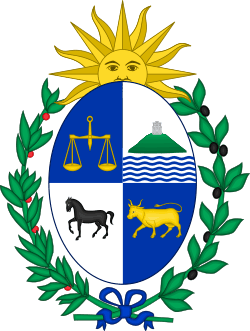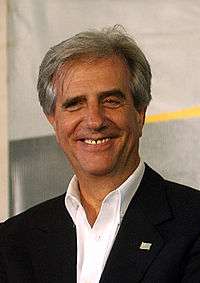Uruguayan general election, 2014
|
| ||||||||||||||||||||
| ||||||||||||||||||||
| ||||||||||||||||||||
| ||||||||||||||||||||
 |
|---|
| This article is part of a series on the politics and government of Uruguay |
|
Legislative |
|
| Foreign relations |
|
See also |
General elections were held in Uruguay on 26 October 2014, alongside a constitutional referendum. Since no presidential candidate received an absolute majority, a runoff took place on 30 November 2014. Primary elections had been held on 1 June 2014.
Incumbent President José Mujica was ineligible to run owing to a constitutional limit on serving consecutive terms. The governing Broad Front nominated former President Tabaré Vázquez as its candidate, with Vázquez defeating Luis Alberto Lacalle Pou of the National Party in the second round of voting by the widest margin since the run-off system was first implemented in 1999. The Broad Front also maintained its majority in the Chamber of Deputies, winning 50 of the 99 seats.
Campaign
There were around 250,000 new voters in this election, many of them not used to traditional media.[1] Campaign managers and advertising agents took notice of this new trend, and implemented an important portion of their campaign via social media.[2]
Opinion polls
| Poll source | Date(s) administered | Sample size | Broad Front | National Party | Colorado Party | Independent Party | Popular Assembly | None/Unsure |
|---|---|---|---|---|---|---|---|---|
| Cifra[3] | 10–21 July 2013 | 1,021 | 43% | 25% | 14% | 2% | - | 16% |
| Mori[4] | 21 December 2013 | - | 44% | 25% | 14% | 2% | - | 11% |
| Cifra[5] | 19 February 2014 | 1,000 | 45% | 28% | 15% | - | - | - |
Results
| Party | Presidential candidate | First round | Second round | Seats | ||||||
|---|---|---|---|---|---|---|---|---|---|---|
| Votes | % | Votes | % | Chamber | +/– | Senate | +/– | |||
| Broad Front | Tabaré Vázquez | 1,134,187 | 49.45 | 1,226,105 | 56.63 | 50 | 0 | 15 | –1 | |
| National Party | Luis Alberto Lacalle Pou | 732,601 | 31.94 | 939,074 | 43.37 | 32 | +2 | 10 | +1 | |
| Colorado Party | Pedro Bordaberry | 305,699 | 13.33 | 13 | –4 | 4 | –1 | |||
| Independent Party | Pablo Mieres | 73,379 | 3.20 | 3 | +1 | 1 | +1 | |||
| Popular Assembly | Gonzalo Abella | 26,869 | 1.17 | 1 | +1 | 0 | 0 | |||
| Partido Ecologista Radical Intransigente | César Vega | 17,835 | 0.78 | 0 | New | 0 | New | |||
| Workers' Party | Rafael Fernández | 3,218 | 0.14 | 0 | - | 0 | - | |||
| Invalid/blank votes | 78,329 | – | 156,051 | – | – | – | – | – | ||
| Total | 2,372,117 | 100 | 2,321,230 | 100 | 99 | 0 | 30 | 0 | ||
| Registered voters/turnout | 2,620,791 | 90.51 | 2,620,791 | 88.57 | – | – | – | – | ||
| Source: Corte Electoral, Buenos Aires Herald | ||||||||||
Within the Broad Front coalition, Movement of Popular Participation won six seats in the Senate, the Liber Seregni Front won three and the Socialist Party won two.[6] Following the second round of the presidential elections, the Broad Front gained an extra seat in the Senate, giving them a majority, as Vice President Raúl Fernando Sendic Rodríguez automatically became a member.[6]
See also
References
- ↑ "New voters, a mysterious lot". El Observador. 29 January 2014. (in Spanish)
- ↑ "Advertising agents working behind the candidates". El Observador. 6 February 2014. (in Spanish)
- ↑ "Fifteen months ahead of presidential election, Uruguay's ruling coalition continues to lead". Merco Press. 26 July 2013. Retrieved 25 May 2014.
- ↑ "Uruguay's ruling coalition ends 2013 with a majority lead in public opinion". Merco Press. 21 December 2013. Retrieved 25 May 2014.
- ↑ "Ruling party leads in opinion polls". The Economist. 7 March 2014. Retrieved 25 May 2014.
- 1 2 "Broad Front secures majority in Congress". Buenos Aires Herald. 28 October 2014.
External links
| Wikimedia Commons has media related to 2014 Uruguayan general election. |

